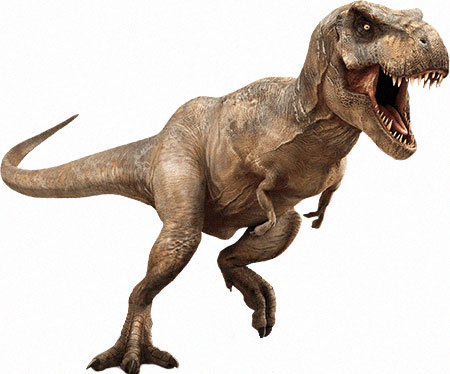 Tyrannosaurus rex are pre-historic animals living around 65 million years ago. Thus, none of the early-day humans have watched them in reality. It is because early humans appeared around 20 million years ago. But thanks to paleontologists (scientists who study fossils of animals, plants, and other living things) who have through their intense research and with the help of computers, re-created their appearance. They have always been fascinating scientists and many movies have shown them in action.
Tyrannosaurus rex are pre-historic animals living around 65 million years ago. Thus, none of the early-day humans have watched them in reality. It is because early humans appeared around 20 million years ago. But thanks to paleontologists (scientists who study fossils of animals, plants, and other living things) who have through their intense research and with the help of computers, re-created their appearance. They have always been fascinating scientists and many movies have shown them in action.
Tyrannosaurus rex (T. Rex) derives its name from Latin and Greek Languages. Tyrannos stands for cruel, Saurus stands for a lizard, and rex means “king”. So, its apparent meaning would be “King of the cruel lizards”.
Appearance – What Do They Look Like?
 T. rex are one of the largest dinosaurs ever lived on the Earth. They were around 40 feet long and 20 feet tall. The weight of an average-sized T. Rex was around 14 Metric tons. They had very muscular legs and a very strong tail. Their front limbs were very short each having two fingers. They possessed thick and heavy skull and the length of their jaw reached up to 4 feet. Their skin was scaly much like fishes in the ocean. They had serrated (saw-like) conical teeth. They had a very strong jaw with overwhelming strength.
T. rex are one of the largest dinosaurs ever lived on the Earth. They were around 40 feet long and 20 feet tall. The weight of an average-sized T. Rex was around 14 Metric tons. They had very muscular legs and a very strong tail. Their front limbs were very short each having two fingers. They possessed thick and heavy skull and the length of their jaw reached up to 4 feet. Their skin was scaly much like fishes in the ocean. They had serrated (saw-like) conical teeth. They had a very strong jaw with overwhelming strength.
Habitat
Around 65 million years ago, when T. rex lived on Earth, the entire landscape was very different from present-day landscapes. They mostly lived in the North American continent, but recent fossil discoveries suggest that their ancestors also lived in Asia.
Scientific studies support the view that they prefer humid and semi-tropical environments. Coastal swamps, water bodies, and open forests are included in their preferred habitats. Such environments also provided them with their prey to feed upon.
Diet
These huge-sized animals were apex predators of their time. In general, T. Rex hunted medium to large-sized herbivorous dinosaurs for their food. In North America, they had hadrosaurs and ceratopsians as their potential prey. Its powerful jaws and large body helped in hunting various other animals of that time. They were very fast-moving animals and could eat a few hundred kilograms in a sitting. Furthermore, it is estimated that they could take around 200 kg of meat in a single bite.
T. rex also consumed the dead bodies of animals to feed themselves. In general, they didn’t consume animals of their kind. However, they only killed other T. rex in the fight for food snatching and taking over other member’s territory. The exact hunting strategy of T. rex is still under debate. However, most scientists agree that they used both ambush and active attacking strategies.
Behavior and Lifestyle
According to some studies, T. Rex were found to hunt in groups due to their extremely short front limbs (arms). Their front limbs were not sufficient to break the defense mechanisms of the prey. So, hunting in the groups made it easier for them to hunt and protect themselves. However, they also acted as solitary hunters. Sometimes they also involved in scavenger activities (eating dead animals). Usually, they led a solitary life until it becomes necessary for them to form groups.
Discovery
 Barnum Brown is considered as the discoverer of a partial skeleton of Tyrannosaurus Rex (T. Rex). He found the fossil in the eastern part of Wyoming State in the year 1900. Several other people also found various fossilized parts of T. Rex.
Barnum Brown is considered as the discoverer of a partial skeleton of Tyrannosaurus Rex (T. Rex). He found the fossil in the eastern part of Wyoming State in the year 1900. Several other people also found various fossilized parts of T. Rex.
The fossil remains of T. Rex were also discovered in western parts of the US from Virginia to Texas and also in Alberta, Canada. However, some scientists think that T. Rex were originated from Asia, as supported by research about their skeletal features. As per one estimate they crossed over from Asia to the USA dating back to around 67 million years in the past. Some other scientists hold the view that their species was evolved in the present-day United States.
Facts
- A fully grown male T. rex has 12 inches of large teeth with a whooping bite force of 5,800 kg. You can get the idea from adult human bite force which is 39 kg.
- T. rex have been extinct from the Earth millions of years ago. However, birds are their closest relatives.
- Fossilized remains of T. rex suggest that they had an average lifespan of 30 years.





